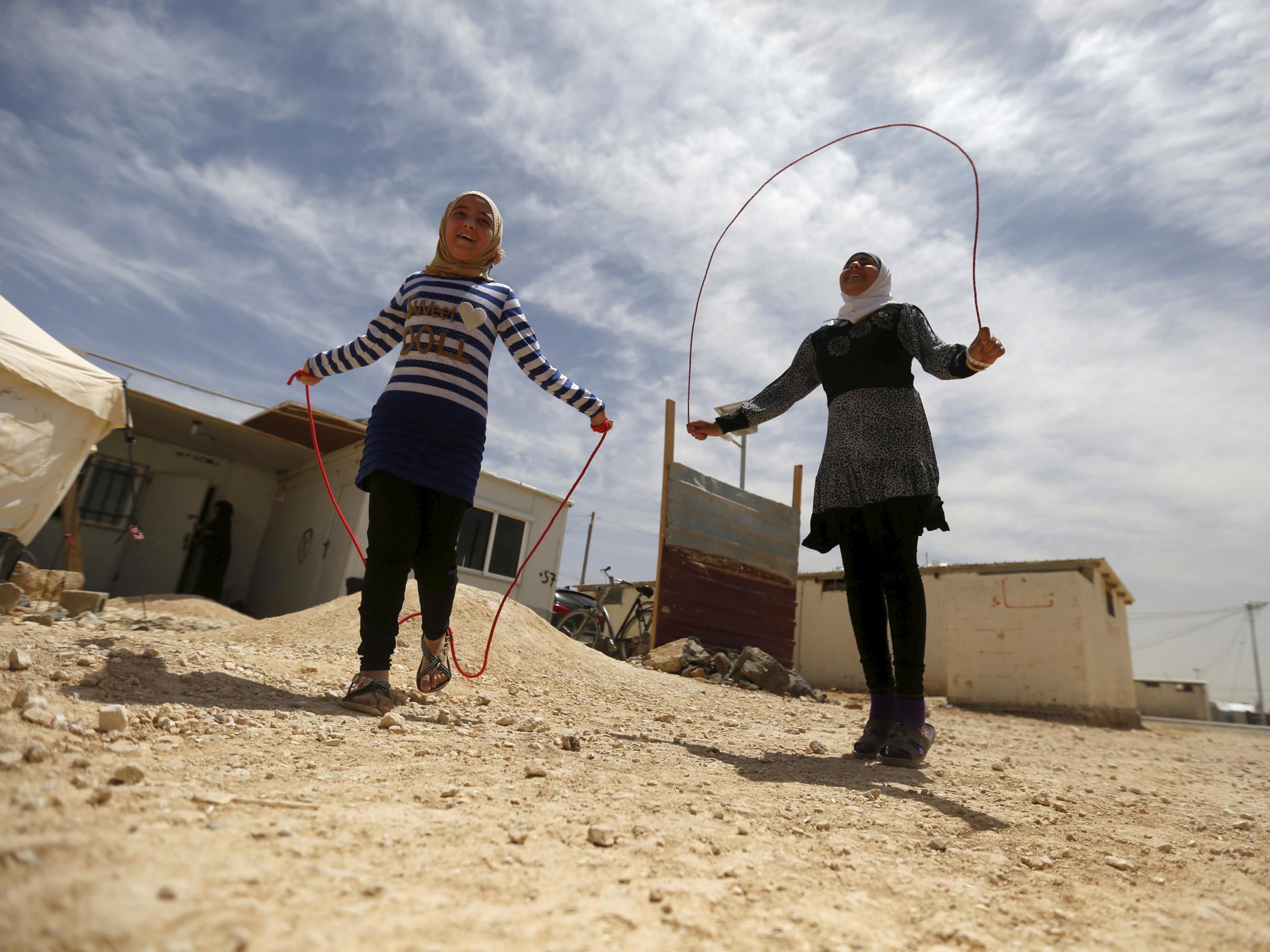Children in Jordan refugee camp at risk of becoming Syria’s ‘lost generation’
While Syrian refugee children have undoubtedly experienced trauma, many are determined not to be defined by their past

Your support helps us to tell the story
From reproductive rights to climate change to Big Tech, The Independent is on the ground when the story is developing. Whether it's investigating the financials of Elon Musk's pro-Trump PAC or producing our latest documentary, 'The A Word', which shines a light on the American women fighting for reproductive rights, we know how important it is to parse out the facts from the messaging.
At such a critical moment in US history, we need reporters on the ground. Your donation allows us to keep sending journalists to speak to both sides of the story.
The Independent is trusted by Americans across the entire political spectrum. And unlike many other quality news outlets, we choose not to lock Americans out of our reporting and analysis with paywalls. We believe quality journalism should be available to everyone, paid for by those who can afford it.
Your support makes all the difference.Amidst the desert sands and pressed up against the Syrian border, there is a town that did not exist seven years ago.
It is a collection of homes cobbled together from corrugated iron and rough cement; where children are too often taught in makeshift, overheated classrooms.
This is Zaatari refugee camp in northern Jordan, one of the largest in the world with almost 80,000 people scraping out an existence. Nearly all reached it to escape the bombs and bullets of the seven-year Syrian civil war.
Many who embarked on that journey never arrived: children saw fathers beaten in front of them and relatives die en-route.
Rula is one of the lucky ones. The childhood home she fled in the anti-government region of Daraa has been “completely destroyed” and she has little chance of ever returning.
As armed men advanced on her village one night, Rula’s family packed everything they could carry and fled to the Jordanian border.
Nearly six years later Rula, now 16, has watched her world in Zaatari narrow: child marriage and child labour are rife.
Both her sisters, now 19 and 21, would have studied at Damascus University but instead married as teenagers and now have children. Permits are needed to leave the camp even temporarily.
Rula’s father, Yasin, 54, shook his head as he said: “We can’t even think about the future.” Wearing a brave smile under a white hijab decorated with flowers, Rula insists she will not give up her dream of becoming a human rights lawyer. “I want to widen my mind and learn more,” she says. “I want to help people and make them happy. There is something good to see everywhere.”
She has even created activities for younger children in the camp under the motto “A Fingerprint of Hope”.
I want to widen my mind and learn more. I want to help people and make them happy. There is something good to see everywhere
Rula studies with the VoiceMore programme in a centre made from metal sheeting. Areas surrounding its small compound have irregular electricity and no mains water, but inside, the walls are decorated with vibrant drawings created by her 20 or so peers.
All have been through trauma, but Rula is not alone in her determination not to be defined by her past.
Azeh, 16, escaped a violent and abusive marriage she entered last year.
Areej, also 16, “remembers everything” about her march from Syria aged 11, how she carried a large medicine bag on her back as she sneaked past soldiers, fearing for her life. Her focus now is on finding a way to study as a nurse to help fellow refugees around the Middle East.
Ali dreams that the short stories he writes on the deprivation and frustration he sees will one day get an international audience. Zain wants to be a geography teacher, perhaps with a sideline in football coaching.
Their teacher, Hatem, a Jordanian who gave up a career in mechanical engineering, says such resilience is heartening.
“Working with such young people, who are still really ambitious and still have energy and are still motivated after all the hardships they have been through, is inspiring,” he explains.
The tragedy is that despite their courage and ambitions, these children may not be able to fulfil their potential. They risk becoming part of Syria’s lost generation: children who have been stripped of the chance to develop into the adults they could have been because of the war.
That is why The Independent has launched our Learn To Live campaign, in partnership with NGO organisation War Child. The charity runs VoiceMore in Zaatari and similar programmes in conflict zones worldwide, ensuring refugee children have essential educational and psychological support.
Our objectives over the next 10 weeks are simple: to help ensure children, like Rula and her classmates, know they are not forgotten.
We also aim to increase empathy and understanding between pupils of all backgrounds.
The children in Zaatari are already wondering which UK school they will be twinned with and what it will be like. “Are they addicted to smartphones?” one child asks. Zain wants to know if they also support his beloved Barcelona FC.
In the coming months we will follow these children, and others, from the Central African Republic to former Islamic State-controlled areas in Iraq, as they learn the answers.
“This is a beautiful project,” says Ali. “It will help me gain experiences, share knowledge and information, and understand differences and similarities.”
Already pupils in London schools are writing letters and sending video messages. The children in Zaatari will soon know that they are not lost.
Join our commenting forum
Join thought-provoking conversations, follow other Independent readers and see their replies
Comments